13 mar 2016
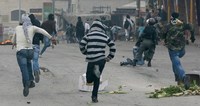
A Palestinian boy was seriously wounded in northern Ramallah on Sunday evening after Israeli occupation forces (IOF) used lethal force to disperse protesters.
Local sources said that the 14-year-old child Uday Salama was hit with IOF bullets during confrontations between the IOF soldiers and local protesters in al-Mazra’a al-Gharbiya village.
The sources said that the boy was transferred to hospital suffering from serious injuries.
14-year old boy shot in chest by Israeli troops during invasion of Palestinian village
A Palestinian boy is in serious condition after he was shot in the chest with live ammunition by Israeli forces who invaded his village, al-Mazraa al-Gharbiya, on Sunday.
The boy, 14, was shot when Israeli troops opened fire on a group of teens who were allegedly throwing stones at the armored vehicles and military jeeps that were invading their village
The child was identified as Adi Kamal Salamah. He was taken to the Palestine Medical Complex in Ramallah, and was listed as being in serious but stable condition, according to medical sources.
Local sources stated that Israeli forces moved into the area on Sunday afternoon with numerous armored vehicles and dozens of soldiers, and began firing both rubber-coated steel bullets and live ammunition at village residents.
A number of teenagers then began throwing stones and bottles at the invading troops, according to local sources.
Salamah is just the latest casualty of Israeli forces, who have wounded more than 2,000 Palestinian children over the past six months.
Local sources said that the 14-year-old child Uday Salama was hit with IOF bullets during confrontations between the IOF soldiers and local protesters in al-Mazra’a al-Gharbiya village.
The sources said that the boy was transferred to hospital suffering from serious injuries.
14-year old boy shot in chest by Israeli troops during invasion of Palestinian village
A Palestinian boy is in serious condition after he was shot in the chest with live ammunition by Israeli forces who invaded his village, al-Mazraa al-Gharbiya, on Sunday.
The boy, 14, was shot when Israeli troops opened fire on a group of teens who were allegedly throwing stones at the armored vehicles and military jeeps that were invading their village
The child was identified as Adi Kamal Salamah. He was taken to the Palestine Medical Complex in Ramallah, and was listed as being in serious but stable condition, according to medical sources.
Local sources stated that Israeli forces moved into the area on Sunday afternoon with numerous armored vehicles and dozens of soldiers, and began firing both rubber-coated steel bullets and live ammunition at village residents.
A number of teenagers then began throwing stones and bottles at the invading troops, according to local sources.
Salamah is just the latest casualty of Israeli forces, who have wounded more than 2,000 Palestinian children over the past six months.
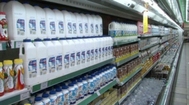
Israeli troops, on Sunday, suppressed a peaceful rally organized by five dairy companies at Ofer checkpoint, to the southwest of Ramallah, to protest being denied the marketing of their products in Jerusalem.
Soldiers attacked, with teargas canisters, a convoy of trucks belonging to the five companies, while gathering near the checkpoint in protest.
Israel recently decided to ban the five companies – Hamoudah, al-Jideedi, Arryan, Asslwa and Saniora – from selling their products in Jerusalem.
Amjad Muhtaseb, a marketing official at al-Jideedi, told WAFA that Israeli authorities cited a lack of Hebrew labels at the five companies’ products, as a pretext to ban their selling in Jerusalem, describing the decision as a “political” one.
He added that the decision constitutes a violation against Paris Protocols, signed between Israel and the Palestinian Authority in 1994.
Soldiers attacked, with teargas canisters, a convoy of trucks belonging to the five companies, while gathering near the checkpoint in protest.
Israel recently decided to ban the five companies – Hamoudah, al-Jideedi, Arryan, Asslwa and Saniora – from selling their products in Jerusalem.
Amjad Muhtaseb, a marketing official at al-Jideedi, told WAFA that Israeli authorities cited a lack of Hebrew labels at the five companies’ products, as a pretext to ban their selling in Jerusalem, describing the decision as a “political” one.
He added that the decision constitutes a violation against Paris Protocols, signed between Israel and the Palestinian Authority in 1994.
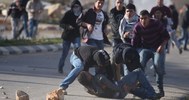
A 16-year-old Palestinian boy was hit and injured by Israeli bullet fire in the blockaded Gaza Strip on early Sunday morning.
Spokesperson for the Palestinian Health Ministry, Ashraf al-Qudra, said a Palestinian minor sustained bullet wounds in his hands after he was shot by the Israeli occupation soldiers stationed to the east of Gaza City.
The casualty was rushed to a local hospital to be urgently treated for the inflicted wounds. Earlier on Saturday, an Israeli raid on a Palestinian civilian home in northern Gaza Strip took away the lives of two Palestinian children, Yassin and Israa Abu Khousa.
A striking surge has been documented recently in the Israeli attacks and raids on Palestinian children, farmers, fishermen, and civilians living in the besieged coastal enclave of Gaza.
Spokesperson for the Palestinian Health Ministry, Ashraf al-Qudra, said a Palestinian minor sustained bullet wounds in his hands after he was shot by the Israeli occupation soldiers stationed to the east of Gaza City.
The casualty was rushed to a local hospital to be urgently treated for the inflicted wounds. Earlier on Saturday, an Israeli raid on a Palestinian civilian home in northern Gaza Strip took away the lives of two Palestinian children, Yassin and Israa Abu Khousa.
A striking surge has been documented recently in the Israeli attacks and raids on Palestinian children, farmers, fishermen, and civilians living in the besieged coastal enclave of Gaza.
12 mar 2016
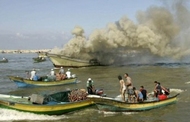
Israeli naval boats, Saturday, targeted Palestinian fishermen’s boats with several missiles, despite sailing within the unilaterally-designated allowed fishing zone offshore, to the northwest of Gaza City.
WAFA correspondence said that soldiers fired at least six missiles at Palestinian fishermen’s boats, despite sailing within the six-nautical-mile allowed fishing zone. The current six-nautical-mile fishing zone falls drastically short of the twenty nautical miles allocated to Palestinian fishermen in the 1993 Oslo Accords.
The attack caused severe damages to three boats, whereas no injuries were reported among fishermen who were forced to leave the sea, for fear of being injured, killed, or detained.
The Israeli navy targets Gaza fishermen and farmers along the borderline on an almost daily basis, in a blatant breach of a ceasefire agreement reached between Israel and armed Palestinian groups in August of 2014, following 51 days of bloody aggression on the Gaza Strip, which claimed the lives of over 2.200 Palestinians, most of whom were civilians.
According to the Palestinian Center for Human Rights (PCHR), all Israeli attacks on Palestinian fishermen have taken place within the distance of six nautical miles, which it said “proves that Israeli forces' policies aim to tighten restrictions on the Gaza Strip's fishermen and their livelihoods.”
Israel has imposed a tightened blockade since 2007 after Hamas won the democratic legislative election and took over power in the Strip.
WAFA correspondence said that soldiers fired at least six missiles at Palestinian fishermen’s boats, despite sailing within the six-nautical-mile allowed fishing zone. The current six-nautical-mile fishing zone falls drastically short of the twenty nautical miles allocated to Palestinian fishermen in the 1993 Oslo Accords.
The attack caused severe damages to three boats, whereas no injuries were reported among fishermen who were forced to leave the sea, for fear of being injured, killed, or detained.
The Israeli navy targets Gaza fishermen and farmers along the borderline on an almost daily basis, in a blatant breach of a ceasefire agreement reached between Israel and armed Palestinian groups in August of 2014, following 51 days of bloody aggression on the Gaza Strip, which claimed the lives of over 2.200 Palestinians, most of whom were civilians.
According to the Palestinian Center for Human Rights (PCHR), all Israeli attacks on Palestinian fishermen have taken place within the distance of six nautical miles, which it said “proves that Israeli forces' policies aim to tighten restrictions on the Gaza Strip's fishermen and their livelihoods.”
Israel has imposed a tightened blockade since 2007 after Hamas won the democratic legislative election and took over power in the Strip.

Poisonous substances landed from Israeli aircrafts in Palestinian agricultural and residential areas in the Jordan Valley on Friday, according to local sources.
Azem Mohamed, coordinator of agricultural relief projects in Jordan Valley, said that the Israeli side justified its action by claiming it was aimed at fighting wild animals in the Jordan Valley.
Mohamed affirmed to the Palestinian Information Center (PIC) that the dropped materials pose a risk to livestock, which the majority of the Jordan Valley residents depend on for food and income.
He added that these materials also endanger the health and lives of the residents, especially the children, because of their presence near their homes and farms.
The agricultural official warned the residents of tampering with these hazardous things and urged to them to necessarily inform the Palestinian authorities in their areas if they found them so as to destroy them in a proper manner.
Azem Mohamed, coordinator of agricultural relief projects in Jordan Valley, said that the Israeli side justified its action by claiming it was aimed at fighting wild animals in the Jordan Valley.
Mohamed affirmed to the Palestinian Information Center (PIC) that the dropped materials pose a risk to livestock, which the majority of the Jordan Valley residents depend on for food and income.
He added that these materials also endanger the health and lives of the residents, especially the children, because of their presence near their homes and farms.
The agricultural official warned the residents of tampering with these hazardous things and urged to them to necessarily inform the Palestinian authorities in their areas if they found them so as to destroy them in a proper manner.
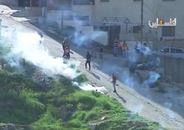
Two Palestinians have been injured Friday, and dozens suffered the effects of teargas inhalation after Israeli soldiers invaded Silwad, east of the central West Bank city of Ramallah. The army invaded the al-Jalazoun refugee camp, and clashed with many Palestinians, wounding three. Clashes also took place near the Ofer detention center.
A large military force gathered near Settlement Road #60, close to Silwad town, before dozens of soldiers invaded the Shuhada Street, and were deployed between many homes, to ambush the protesters.
The soldiers fired many gas bombs, rubber-coated steel bullets, and sponge-tipped bullets, wounding two Palestinians with sponge-tipped bullets from a very close range.
The army also fired many gas bombs on the protesters, and towards a number of homes in the town, causing dozens of residents to suffer the effects of teargas inhalation.
In related news, the soldiers invaded the al-Jalazoun refugee camp, north of Ramallah, and fired dozens of rubber-coated steel bullets, wounding three Palestinians, while many suffered the effects of teargas inhalation.
Clashes also took place near the Ofer Israeli detention center and military base; the soldiers fired many gas bombs on the protesters, who managed to throw some of those gas bombs back on the troops. Many Palestinians suffered the effects of teargas inhalation.
On Friday evening, the soldiers invaded Qabatia town, south of Jenin, and installed a roadblock, closing the town’s main road, before kidnapping two young Palestinian men.
The soldiers stopped and searched dozens of cars, and examined the ID cards of the passengers while interrogating some of them.
A large military force gathered near Settlement Road #60, close to Silwad town, before dozens of soldiers invaded the Shuhada Street, and were deployed between many homes, to ambush the protesters.
The soldiers fired many gas bombs, rubber-coated steel bullets, and sponge-tipped bullets, wounding two Palestinians with sponge-tipped bullets from a very close range.
The army also fired many gas bombs on the protesters, and towards a number of homes in the town, causing dozens of residents to suffer the effects of teargas inhalation.
In related news, the soldiers invaded the al-Jalazoun refugee camp, north of Ramallah, and fired dozens of rubber-coated steel bullets, wounding three Palestinians, while many suffered the effects of teargas inhalation.
Clashes also took place near the Ofer Israeli detention center and military base; the soldiers fired many gas bombs on the protesters, who managed to throw some of those gas bombs back on the troops. Many Palestinians suffered the effects of teargas inhalation.
On Friday evening, the soldiers invaded Qabatia town, south of Jenin, and installed a roadblock, closing the town’s main road, before kidnapping two young Palestinian men.
The soldiers stopped and searched dozens of cars, and examined the ID cards of the passengers while interrogating some of them.
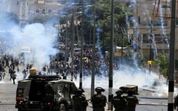
Israeli soldiers invaded, on Friday evening, Abu Dis town, east of occupied Jerusalem, and clashed with dozens of local youths, wounding nineteen Palestinians, including one who was shot in his eye.
Bassam Bahar, head of the Abu Dis Lands Defence Committee, said the several Israeli military vehicles invaded the town and fired dozens of gas bombs, and rubber-coated steel bullets.
The Red Crescent Society said 19 Palestinians were injured, four of them with rubber-coated steel bullets, including one who was shot in the eye, and fifteen others suffered the effects of teargas inhalation.
Many Palestinians were also injured at the northern entrance of the West Bank city of Bethlehem, during clashes with Israeli soldiers.
Medical sources said some of the wounded were shot with rubber-coated steel bullets, and many others suffered the effects of teargas inhalation.
Bassam Bahar, head of the Abu Dis Lands Defence Committee, said the several Israeli military vehicles invaded the town and fired dozens of gas bombs, and rubber-coated steel bullets.
The Red Crescent Society said 19 Palestinians were injured, four of them with rubber-coated steel bullets, including one who was shot in the eye, and fifteen others suffered the effects of teargas inhalation.
Many Palestinians were also injured at the northern entrance of the West Bank city of Bethlehem, during clashes with Israeli soldiers.
Medical sources said some of the wounded were shot with rubber-coated steel bullets, and many others suffered the effects of teargas inhalation.
11 mar 2016
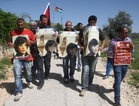
Israeli soldiers assaulted, on Friday, the weekly nonviolent protest against the Annexation Wall and colonies, in Bil’in village, near the central West Bank city of Ramallah, and fired dozens of gas bombs, causing many to suffer the effects of tear gas inhalation.
Dozens of locals, Israeli and international peace activists marched from the center of the village, heading toward the village’s orchards and the Annexation Wall while chanting for the liberation of Palestine by ending the brutal and illegal Israeli occupation.
The Popular Committee against the Wall and Settlements in Bil’in said the soldiers fired dozens of rubber-coated metal bullets and gas bombs on the nonviolent protesters, in addition to firing gas bombs that detonate twice, and can hit targets as far as 1000 meters.
The Committee stated that this is the same type of gas bomb that killed Bassem Abu Rahma, on April 17 2009, and led to dozens of injuries over the years, in addition to causing a very serious injury to American peace activist Tristan Anderson, who was suffered quadriplegia after the bomb struck his head, on March 13, 2009.
|Also Read: Jawaher Abu Rahma (Bassem’s sister – killed by the Israeli army on January 1 2011)|
The Committee urged local, regional and international human rights groups to intervene and stop the Israeli military escalation against the Palestinian people.
The attack against the protesters took place when the locals, Israeli and international peace activists marched from the center of the village while military vehicles drove to the village’s southern entrance.
The protesters carried Palestinian flags and pictures of American peace activist Rachel Corrie, who was crushed to death by an Israeli military bulldozer, on March 16 2003, while trying to prevent the army from demolishing a Palestinian home in Rafah, in the southern part of the Gaza Strip.
Abdullah Abu Rahma, the coordinator of the Popular Committee, denounced the Israeli invasion into the Palestine News agency, and the military order shutting it down, in addition to the excessive damage caused by the soldiers who violently searched it.
Abu Rahma said that such violations aim at silencing Palestinian media agencies and journalists, in an attempt to stop them from exposing Israel’s crimes and violations.
He also strongly denounced the Israeli crimes, and violations, targeting the Palestinian people, their homes, lands and property, and the attacks against nonviolent international solidarity activists.
Dozens of locals, Israeli and international peace activists marched from the center of the village, heading toward the village’s orchards and the Annexation Wall while chanting for the liberation of Palestine by ending the brutal and illegal Israeli occupation.
The Popular Committee against the Wall and Settlements in Bil’in said the soldiers fired dozens of rubber-coated metal bullets and gas bombs on the nonviolent protesters, in addition to firing gas bombs that detonate twice, and can hit targets as far as 1000 meters.
The Committee stated that this is the same type of gas bomb that killed Bassem Abu Rahma, on April 17 2009, and led to dozens of injuries over the years, in addition to causing a very serious injury to American peace activist Tristan Anderson, who was suffered quadriplegia after the bomb struck his head, on March 13, 2009.
|Also Read: Jawaher Abu Rahma (Bassem’s sister – killed by the Israeli army on January 1 2011)|
The Committee urged local, regional and international human rights groups to intervene and stop the Israeli military escalation against the Palestinian people.
The attack against the protesters took place when the locals, Israeli and international peace activists marched from the center of the village while military vehicles drove to the village’s southern entrance.
The protesters carried Palestinian flags and pictures of American peace activist Rachel Corrie, who was crushed to death by an Israeli military bulldozer, on March 16 2003, while trying to prevent the army from demolishing a Palestinian home in Rafah, in the southern part of the Gaza Strip.
Abdullah Abu Rahma, the coordinator of the Popular Committee, denounced the Israeli invasion into the Palestine News agency, and the military order shutting it down, in addition to the excessive damage caused by the soldiers who violently searched it.
Abu Rahma said that such violations aim at silencing Palestinian media agencies and journalists, in an attempt to stop them from exposing Israel’s crimes and violations.
He also strongly denounced the Israeli crimes, and violations, targeting the Palestinian people, their homes, lands and property, and the attacks against nonviolent international solidarity activists.
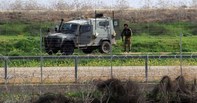
The Israeli occupation forces (IOF) on Friday morning opened fire at Palestinian farmers and shepherds southeast of Gaza City, with no reported casualties.
Media sources in Gaza said that soldiers opened fire from their military jeep at citizens grazing cattle and working their lands east of Johr Addik neighborhood, south of Gaza City.
The intensity of shooting forced the citizens to swiftly leave the area.
The Israeli occupation army has intensified recently its aerial and ground military activities and its attacks on civilians along the borderline of Gaza.
Media sources in Gaza said that soldiers opened fire from their military jeep at citizens grazing cattle and working their lands east of Johr Addik neighborhood, south of Gaza City.
The intensity of shooting forced the citizens to swiftly leave the area.
The Israeli occupation army has intensified recently its aerial and ground military activities and its attacks on civilians along the borderline of Gaza.
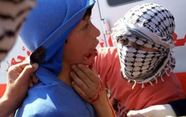
Israeli soldiers shot and injured, Friday, two Palestinian children in Nabi Saleh village, northwest of Ramallah, and fired gas bombs, causing dozens to suffer the effects of tear gas inhalation after the army assaulted the weekly nonviolent protest against the Annexation Wall and colonies.
Medical sources said the soldiers shot Mohammad Naji Tamimi, 9, with a gas bomb in his abdomen, before local medics provided him with the needed treatment, and moved him to a hospital.
Another child was shot with a rubber-coated steel bullet in his cheek, causing a large wound; medics also moved him to a local hospital for treatment, after providing him with the urgently needed medical care.
The sources added that the soldiers fired dozens of gas bombs on the nonviolent protesters, and several homes in the village, causing scores of residents to suffer the effects of tear gas inhalation.
The soldiers used excessive force against the nonviolent protesters, including many women, and dragged them away, in an attempt to stop the protest.
On March 8, the soldiers invaded Nabi Saleh village, and kidnapped nonviolent activist Manal Tamimi, after breaking into her home and searching it, causing excessive damage.
Her husband, Jihad, said a large military force surrounded the home approximately at 1:30 after midnight, before invading the property and kidnapping his wife, and took her to the Benjamin military base, illegally built on the village’s lands.
Medical sources said the soldiers shot Mohammad Naji Tamimi, 9, with a gas bomb in his abdomen, before local medics provided him with the needed treatment, and moved him to a hospital.
Another child was shot with a rubber-coated steel bullet in his cheek, causing a large wound; medics also moved him to a local hospital for treatment, after providing him with the urgently needed medical care.
The sources added that the soldiers fired dozens of gas bombs on the nonviolent protesters, and several homes in the village, causing scores of residents to suffer the effects of tear gas inhalation.
The soldiers used excessive force against the nonviolent protesters, including many women, and dragged them away, in an attempt to stop the protest.
On March 8, the soldiers invaded Nabi Saleh village, and kidnapped nonviolent activist Manal Tamimi, after breaking into her home and searching it, causing excessive damage.
Her husband, Jihad, said a large military force surrounded the home approximately at 1:30 after midnight, before invading the property and kidnapping his wife, and took her to the Benjamin military base, illegally built on the village’s lands.

Israeli occupation forces have now deployed troops and equipment along the Lebanese border, and stepped up military activities in th region on Wednesday, according to Lebanese sources.
For the second consecutive day in a row, the army fired tear gas canisters at Lebanese herders and local farmers working near the border with the occupied Palestinian territories, The Daily Star reported, according to PNN.
“We were proceeding with our lives normally, and everyone was working their land. Then we saw the Israeli patrol and its members begin shooting tear gas at us,” Mustafa Ahmad, one of the herders, said.
On Tuesday, local residents said forces repeatedly shot tear gas canisters during the morning hours. Shortly after, a large number of Israeli military jeeps were stationed in an illegal Israeli settlement across the Lebanese village of Kfar Kila.
According to witness accounts, the military used trees and shrubs for cover, and monitored the movements within Lebanon as motorized patrols were conducted.
According to alBawaba, local sources say Israeli patrols along the border have increased in the past week, with Israeli soldiers taking up ambush positions in the area.
The activities have sparked fears among local residents, who question the motives behind Israel’s latest transgression, The Daily Star said.
Israel launched two wars on Lebanon, in 2000 and 2006. About 1,200 Lebanese, most of them civilians, lost their lives during the 33-day war in the summer of 2006.
Related: Israel Prepares for Military Actions in Syria and Lebanon
For the second consecutive day in a row, the army fired tear gas canisters at Lebanese herders and local farmers working near the border with the occupied Palestinian territories, The Daily Star reported, according to PNN.
“We were proceeding with our lives normally, and everyone was working their land. Then we saw the Israeli patrol and its members begin shooting tear gas at us,” Mustafa Ahmad, one of the herders, said.
On Tuesday, local residents said forces repeatedly shot tear gas canisters during the morning hours. Shortly after, a large number of Israeli military jeeps were stationed in an illegal Israeli settlement across the Lebanese village of Kfar Kila.
According to witness accounts, the military used trees and shrubs for cover, and monitored the movements within Lebanon as motorized patrols were conducted.
According to alBawaba, local sources say Israeli patrols along the border have increased in the past week, with Israeli soldiers taking up ambush positions in the area.
The activities have sparked fears among local residents, who question the motives behind Israel’s latest transgression, The Daily Star said.
Israel launched two wars on Lebanon, in 2000 and 2006. About 1,200 Lebanese, most of them civilians, lost their lives during the 33-day war in the summer of 2006.
Related: Israel Prepares for Military Actions in Syria and Lebanon
10 mar 2016
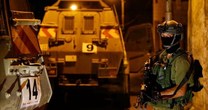
The Israeli Occupation Forces (IOF) launched at dawn Thursday a large-scale raid and arrest campaign throughout the West Bank.
In Nablus, Israeli forces arrested a Palestinian young man after breaking into his house. Several raids into a number of houses in Iraq Burin town south of the city were also reported.
Two young men were arrested during the raids. In Qalqilia, IOF brutally stormed al-Hoja town and broke into the house of Bashar Musalha who was shot and killed by Israeli policemen for allegedly carrying out anti-occupation attack in Jaffa two days ago.
His father, four brothers, and cousin were arrested during the violent raid while a number of locals were summoned for investigation, the PIC reporter said. Meanwhile, Israeli bulldozers closed all entrances to the town which led to the outbreak of violent clashes amid heavy fire of teargas bombs.
Nearly 13 citizens suffered effects of teargas inhalation including children and elderly persons. In Salfit, Israeli forces stormed al-Zawiya town and carried out a search campaign into several local homes including the house of Abdul Rahman Radad who allegedly carried out an anti-occupation attack in Petah Tikva two days ago.
The IOF soldiers threatened to demolish the house of the Radad family, the PIC reporter quoted locals as saying. In Jenin, two youths were arrested after Israeli forces stormed different neighborhoods in Qabatia and Yabad towns. Several houses were also stormed during the raid, while a number of checkpoints were erected. In al-Khalil, Israeli forces detained two brothers, who had earlier served time in Israeli jails, after breaking into their family house south of the city.
In Nablus, Israeli forces arrested a Palestinian young man after breaking into his house. Several raids into a number of houses in Iraq Burin town south of the city were also reported.
Two young men were arrested during the raids. In Qalqilia, IOF brutally stormed al-Hoja town and broke into the house of Bashar Musalha who was shot and killed by Israeli policemen for allegedly carrying out anti-occupation attack in Jaffa two days ago.
His father, four brothers, and cousin were arrested during the violent raid while a number of locals were summoned for investigation, the PIC reporter said. Meanwhile, Israeli bulldozers closed all entrances to the town which led to the outbreak of violent clashes amid heavy fire of teargas bombs.
Nearly 13 citizens suffered effects of teargas inhalation including children and elderly persons. In Salfit, Israeli forces stormed al-Zawiya town and carried out a search campaign into several local homes including the house of Abdul Rahman Radad who allegedly carried out an anti-occupation attack in Petah Tikva two days ago.
The IOF soldiers threatened to demolish the house of the Radad family, the PIC reporter quoted locals as saying. In Jenin, two youths were arrested after Israeli forces stormed different neighborhoods in Qabatia and Yabad towns. Several houses were also stormed during the raid, while a number of checkpoints were erected. In al-Khalil, Israeli forces detained two brothers, who had earlier served time in Israeli jails, after breaking into their family house south of the city.

Violent clashes broke out Wednesday night with invading Israeli troops in the towns of Araba and Kafr Ra'ie, south of Jenin city.
According to Palestinian security sources, several citizens suffered from inhaling tear gas during the events.
The soldiers patrolled, aboard military vehicles, different alleys and streets in the towns as they were provocatively firing some shots to stir up confrontations with local young men.
During their campaign in Kafr Ra'ie, the soldiers stormed and ransacked the house of a citizen identified as Jamal Jawabreh and interrogated his family, without making arrests.
According to Palestinian security sources, several citizens suffered from inhaling tear gas during the events.
The soldiers patrolled, aboard military vehicles, different alleys and streets in the towns as they were provocatively firing some shots to stir up confrontations with local young men.
During their campaign in Kafr Ra'ie, the soldiers stormed and ransacked the house of a citizen identified as Jamal Jawabreh and interrogated his family, without making arrests.
9 mar 2016
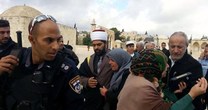
The Israeli police forces brutally and savagely attacked on Wednesday afternoon Palestinian worshipers and peaceful sit-inners near al-Asbat Gate, one of al-Aqsa Mosque gates.
The PIC news reporter said that tensions prevailed in the holy shrine after Israeli forces prevented Hanadi Halawani from entering into the Mosque via al-Asbat Gate although she had served her 6-month access ban.
Meanwhile, the Israeli police allowed 45 settlers to enter the Aqsa Mosque compound under heavy military protection in total provocation to Palestinian worshipers who started shouting Takbeer in protest against the settlers’ presence.
During the protests, an old man suffered different injuries after being attacked by Israeli policemen.
The PIC news reporter said that tensions prevailed in the holy shrine after Israeli forces prevented Hanadi Halawani from entering into the Mosque via al-Asbat Gate although she had served her 6-month access ban.
Meanwhile, the Israeli police allowed 45 settlers to enter the Aqsa Mosque compound under heavy military protection in total provocation to Palestinian worshipers who started shouting Takbeer in protest against the settlers’ presence.
During the protests, an old man suffered different injuries after being attacked by Israeli policemen.
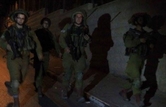
Israeli soldiers invaded, overnight and at dawn Wednesday, several Palestinian communities, in different parts of the occupied West Bank, searched and ransacked many homes, and kidnapped, at least, ten Palestinians.
Media sources in Jenin, in the northern part of the occupied West Bank, has reported that the soldiers kidnapped one Palestinian identified as Moayyad Aref Eshteiwy, 58, after invading and searching his home.
The soldiers also invaded Barta’a village, isolated behind the Annexation Wall southwest of Jenin, before breaking into and searching many homes and a toy store, and kidnapped three brothers, identified as Raja, Younis and Ayed Qabaha.
The three brothers were taken prisoner from their toy store, after the soldiers invaded and searched it, and confiscated many toys.
In addition, the soldiers invaded Hijja village, east of the northern West Bank city of Qalqilia, and broke into the home of Bashar Masalha, who was killed on Tuesday, and interrogated his family.
The soldiers also shot and injured a young man in the Naqqar neighborhood, west of Qalqilia city, during clashes that took place after the army invaded it. He was shot in his arm and was moved to a local hospital.
In Tulkarem, in the northern part of the occupied West Bank, the soldiers invaded the home of a journalist, identified as Sami as-Sa’ey, who works for the al-Fajr al-Jadeed TV in the city, and kidnapped him.
The soldiers also invaded the Deheishe refugee camp, south of the West Bank city of Bethlehem, searched many homes and kidnapped five Palestinians, identified as Rabea’ Mazen Qabaha, 24, Ahmad ‘Aref Sar’awi, Qussai Abu Zeina, Mohammad As’ad Abu Daoud, and Khalil Mohammad Aref.
Media sources said many Palestinians suffered the effects of tear gas inhalation, during clashes with the soldiers after several Israeli army vehicles invaded the refugee camp and searched many homes.
Media sources in Jenin, in the northern part of the occupied West Bank, has reported that the soldiers kidnapped one Palestinian identified as Moayyad Aref Eshteiwy, 58, after invading and searching his home.
The soldiers also invaded Barta’a village, isolated behind the Annexation Wall southwest of Jenin, before breaking into and searching many homes and a toy store, and kidnapped three brothers, identified as Raja, Younis and Ayed Qabaha.
The three brothers were taken prisoner from their toy store, after the soldiers invaded and searched it, and confiscated many toys.
In addition, the soldiers invaded Hijja village, east of the northern West Bank city of Qalqilia, and broke into the home of Bashar Masalha, who was killed on Tuesday, and interrogated his family.
The soldiers also shot and injured a young man in the Naqqar neighborhood, west of Qalqilia city, during clashes that took place after the army invaded it. He was shot in his arm and was moved to a local hospital.
In Tulkarem, in the northern part of the occupied West Bank, the soldiers invaded the home of a journalist, identified as Sami as-Sa’ey, who works for the al-Fajr al-Jadeed TV in the city, and kidnapped him.
The soldiers also invaded the Deheishe refugee camp, south of the West Bank city of Bethlehem, searched many homes and kidnapped five Palestinians, identified as Rabea’ Mazen Qabaha, 24, Ahmad ‘Aref Sar’awi, Qussai Abu Zeina, Mohammad As’ad Abu Daoud, and Khalil Mohammad Aref.
Media sources said many Palestinians suffered the effects of tear gas inhalation, during clashes with the soldiers after several Israeli army vehicles invaded the refugee camp and searched many homes.

Israeli Occupation Forces (IOF) opened fire towards Palestinian agricultural lands east of Deir al-Balah in Gaza Strip on Wednesday morning, forcing local farmers to leave their agricultural lands.
Eyewitnesses told the PIC reporter that farmers and shepherds were forced to leave their fields after Israeli forces stationed at the borderline opened heavy fire at them.
Late Tuesday, IOF soldiers opened random and heavy fire towards Palestinian border areas east of Maghazi refugee camp.
Palestinian farmers whose land lies within or close to an Israeli-enforced buffer zone along the border with Gaza face near-daily fire or threat of fire from Israeli forces, often preventing them from cultivating their crops, according to documentation by rights groups.
The UN Office for the Coordination of Humanitarian Affairs last month reported at least 42 cases of Israeli forces opening fire on Palestinians in the buffer zone, on both land and sea sides.
Eyewitnesses told the PIC reporter that farmers and shepherds were forced to leave their fields after Israeli forces stationed at the borderline opened heavy fire at them.
Late Tuesday, IOF soldiers opened random and heavy fire towards Palestinian border areas east of Maghazi refugee camp.
Palestinian farmers whose land lies within or close to an Israeli-enforced buffer zone along the border with Gaza face near-daily fire or threat of fire from Israeli forces, often preventing them from cultivating their crops, according to documentation by rights groups.
The UN Office for the Coordination of Humanitarian Affairs last month reported at least 42 cases of Israeli forces opening fire on Palestinians in the buffer zone, on both land and sea sides.
